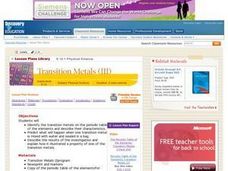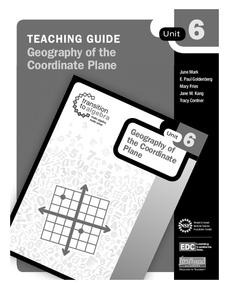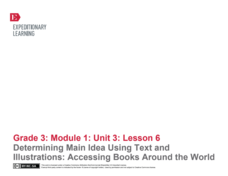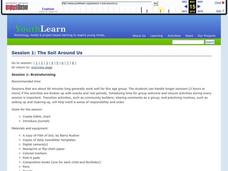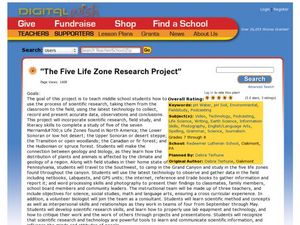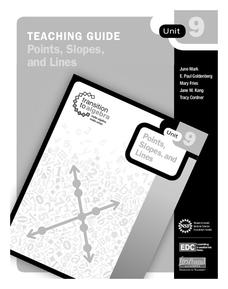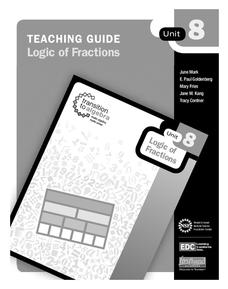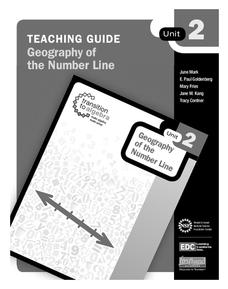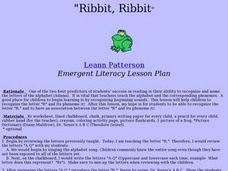Curated OER
Transition Metals (III)
Students discuss transition metals, where they are located on the periodic table, some of the element in the group, and some characteristics of the group. They work in groups to conduct an experiment in which they mix transition metals...
EngageNY
Close Reading of Nasreen's Secret School: How Do People Access Books in Afghanistan?
Third graders continue to practice the close reading skills of capturing the gist and reading again for important details in the sixth lesson in a larger unit. This is a great beginning-of-the-year unit for establishing visible thinking...
Digital Public Library of America
Teaching Guide: Exploring Little Women
Louisa May Alcott's Little Women is a literary masterpiece as well as a timestamp of the formative mid-nineteenth century in America. Using a primary source set of photographs, letters, and portraits, readers discuss the ways...
Curated OER
Art Transitions: Morphs
Students identify artistic expression by participating in a morph activity. In this art analysis lesson, students identify the work of Keith Haring and examine some of his flip books. Students practice creating artistic transitions...
Curated OER
Preparation and Transition to Two-Column Proofs
Students investigate proofs used to solve geometric problems. For this geometry lesson, students read about the history behind early geometry and learn how to write proofs correctly using two columns. The define terminology valuable to...
Curated OER
Learning Library Skills during Technology Transitions
Making the transition to a higher-tech school library or computer lab? This plan suggests 5th graders undertake a scavenger hunt and make a PowerPoint to educate younger schoolmates about how to use information resources in an...
Education Development Center
Thinking Things Through Thoroughly
Problem solving is a skill of its own. Learners use a variety of problems to encourage mental math and logic to get the correct answer. Guiding questions are provided along the way to encourage the right way of thinking to help tackle...
Education Development Center
Geography of the Coordinate Plane
Put the graph into graphing and allow learners to understand the concept of point plotting and how it relates to data. The worksheet provides a nice way to connect data analysis to a graph and make predictions. The worksheets within...
EngageNY
Determining Main Idea Using Text and Illustrations: Accessing Books Around the World
Ease into informational text with the lesson suggested here. Part of a unit series, the lesson draws from previous lessons and acts as a natural moment to add in informational text. Class members read one section of My Librarian is a...
Curated OER
A House for Hermit Crab
Make predictions and recall details while reading A House For Hermit Crab. While you read the story, discuss aspects of the plot and encourage listeners to respond. Extension activities such as crafts, counting, puppets, and...
Curated OER
"The Soil Around Us" Project
Young geographers collect samples of different kinds of soil to match to the soil terms in Barry Rudner's rhyming book Filet of Soil: dirt, mud, dust, soot, etc. They start a glossary for the project on index cards or large sheets...
Curated OER
Sybil Ludington's Ride - a poem
Fourth graders examine the role a teen from the Hudson Valley played in the American Revolution. They view the map of Sybil's ride and calculate the distance using the map's legend.
Curated OER
The Five Life Zone Research Project
Students study five of the seven life zones in North America. In this journalism lesson students use the Scientific Method working in teams. They use lab equipment and technology to create a presentation on five of the seven life zones...
Alabama Learning Exchange
Levers - Weight Lifters
Students investigate how levers help to lift heavy loads. They view and discuss examples of levers, explore various websites, experiment with the levers brought to the class, and watch the video for the book "Mike Mulligan and His Steam...
Education Development Center
Points, Slopes, and Lines
Before graphing and finding distances, learners investigate the coordinate plane and look at patterns related to plotted points. Points are plotted and the goal is to look at the horizontal and vertical distances between coordinates and...
Education Development Center
Area and Multiplication
Take some intellectual fun and apply it to the concept of multiplying expressions together. A guide models how to break two numbers into an area model to multiply together in pieces similar to FOILing. The rest of the puzzles consist of...
Education Development Center
Logic of Algebra
Don't just go through the steps to solve an algebraic equation, show learners how to balance an equation with visual models. The packet introduces the idea of mobile balances to reinforce the idea that both sides must match to make the...
Education Development Center
Logic of Fractions
Before diving into operations with fractions, learners discover the foundation of fractions and how they interact with one another. Exactly as the title says, logic of fractions is the main goal of a resource that shows pupils how...
Education Development Center
Geography of the Number Line
It's more than just numbers on a line, its an organizational, mental math machine to help learners understand the value of numbers. The tool is handy when introducing positive and negative integers to see their values and...
Education Development Center
Micro-Geography of the Number Line
Young mathematicians dive into the number line to discover decimals and how the numbers infinitely get smaller in between. They click the zoom button a few times and learn that the number line doesn't just stop at integers. Includes...
Education Development Center
Area Model Factoring
Introduce learners to what factoring represents and it's relationship to a square with a resource about factoring and the method of area models. The questions are scaffolded to begin with introductory questions and eventually have...
Curated OER
Continents and Oceans on the Move
Students create an awareness of the vast percentage of water covering the earth. They relate similarities/differences between topographical maps and other maps of various time periods. Students examine how to use a topographical map.
Curated OER
Sir Cumference and the Dragon Pi
Geometry adventurers study circumference of a circle as they listen to Sir Circumference and the Dragon Pi, by Cindy Neuschwander. In groups, they use string to measure the diameter and circumference of circular objects and...
Curated OER
Ribbit! Ribbit!
Students research a frog's life cycle and habitat using books, the Internet and lecture. Students make origami frogs, write letters to Toad from Arnold Lobel's "Frog and Toad" and participate in a simulated camouflage activity.
